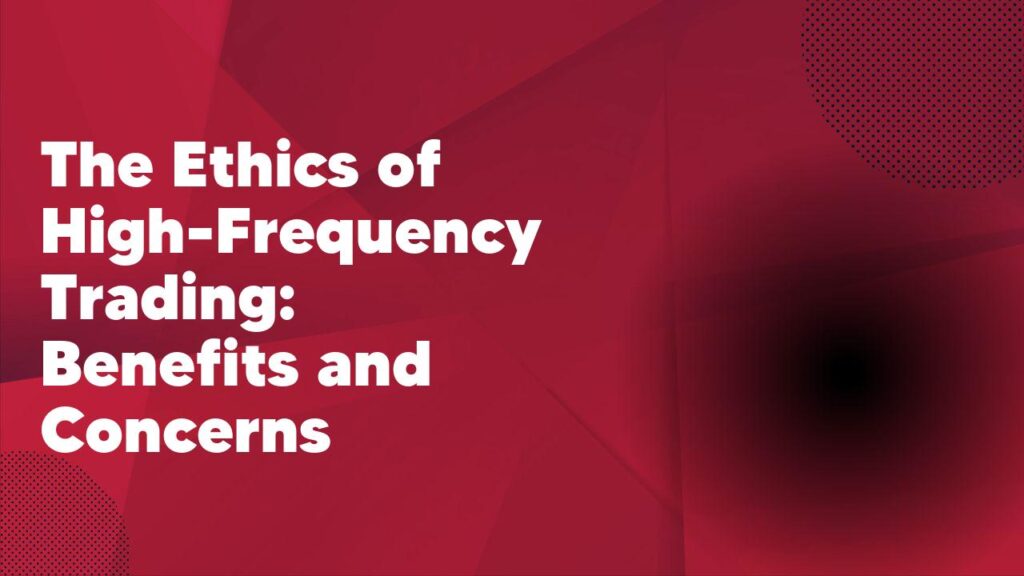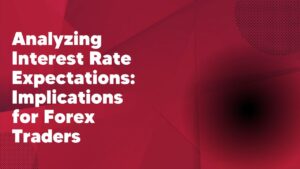High-frequency trading (HFT) is a controversial practice that has gained significant popularity in recent years. Utilizing complex algorithms and super-fast computers, HFT involves buying and selling large volumes of securities within a fraction of a second. While proponents argue that HFT brings numerous benefits to the financial markets, critics point out concerns related to market manipulation, unfair advantages, and potential systemic risks. This raises an important ethical question: is HFT a fair and transparent trading strategy, or does it undermine the principles of fairness and integrity that govern our financial systems? In this paper, we will explore the ethical implications of HFT, examining both the potential benefits and the concerns it raises. By weighing the arguments from both sides, we aim to shed light on the ongoing debate surrounding HFT and provide a comprehensive analysis of its ethical dimensions.
Introduction to high-frequency trading ethics
High-frequency trading (HFT) has become increasingly popular in the Forex industry, revolutionizing the way trades are executed. However, with this rise in technology-driven trading, ethical considerations have also come to the forefront. HFT involves the use of powerful algorithms and superfast computers to execute trades in milliseconds, allowing traders to take advantage of small price discrepancies. While HFT has the potential to provide liquidity and improve market efficiency, concerns have been raised regarding its impact on market fairness and stability. Critics argue that HFT can create an unfair advantage for those with access to advanced technology, as well as potentially contribute to market manipulation and increased volatility. As a result, regulatory bodies have started implementing measures to promote transparency and ensure fairness in HFT practices. Ethical guidelines are being developed to address these concerns, including the promotion of equal access to market data and the prevention of abusive trading strategies. Overall, as HFT continues to shape the Forex industry, maintaining ethical standards will be crucial to ensure a level playing field for all market participants.
Advantages of high-frequency trading
High-frequency trading (HFT) offers numerous advantages in the forex industry. Firstly, HFT allows traders to execute trades at incredibly fast speeds, taking advantage of even the smallest market movements. This speed of execution ensures that traders can capitalize on opportunities before other market participants, maximizing their profit potential. Secondly, HFT eliminates the need for human intervention in trading decisions, reducing the possibility of human error and emotional decision making. By utilizing algorithms and automated systems, HFT can make split-second decisions based on preset parameters, enhancing efficiency and accuracy. Additionally, high-frequency trading provides increased liquidity to the forex market, as HFT firms are constantly placing a high volume of trades and actively contributing to market activity. This increased liquidity benefits all traders, offering tighter bid-ask spreads and reducing slippage. Lastly, HFT has the potential to bring more transparency to the forex market by providing real-time pricing information and reducing information asymmetry. This enables all market participants to have access to the same information, leveling the playing field and increasing market efficiency. Overall, the advantages of high-frequency trading in the forex industry are undeniable, offering speed, efficiency, liquidity, and transparency to traders and contributing to a more efficient market environment.
Concerns about high-frequency trading
High-frequency trading has become a significant concern in the Forex industry. This type of trading involves the use of advanced technology and algorithms to execute trades at lightning-fast speeds. While it may seem like a promising approach for maximizing profits, there are several concerns associated with high-frequency trading. Firstly, it can create an unfair advantage for large institutional investors who have the resources to invest in expensive trading technology. This can lead to an imbalance in the market, making it harder for individual traders to compete. Secondly, high-frequency trading can contribute to market volatility and instability. The rapid buying and selling of assets can amplify small fluctuations and potentially trigger larger market movements. Thirdly, there is a risk of technical glitches or system failures that can have severe consequences. Disrupted connections or delayed orders can result in significant financial losses. Furthermore, high-frequency trading can also lead to a lack of transparency and market manipulation. The complex algorithms used by high-frequency traders can make it difficult to understand the true intentions behind their trades, making it challenging to detect any manipulative practices. In conclusion, while high-frequency trading offers the potential for increased profits, it also brings with it numerous concerns for the Forex industry.
Impact on market fairness
The concept of market fairness is of utmost importance in the Forex industry. Fairness ensures that all participants have an equal opportunity to compete and make informed trading decisions. However, the impact on market fairness can be influenced by various factors. Firstly, market manipulation practices, such as spoofing or front-running, can create an unfair playing field for traders. These practices involve intentionally creating false market signals or taking advantage of non-public information, undermining the principle of fairness. Secondly, the availability and quality of market data play a crucial role in ensuring fairness. Inaccurate or delayed data can favor certain participants and hinder others, distorting market conditions. Additionally, the prevalence of high-frequency trading (HFT) can introduce unfair advantages for those with advanced technologies and algorithms, allowing them to execute trades at lightning-fast speeds. This can disadvantage traditional market participants, limiting their ability to compete on an equal footing. Furthermore, the regulatory framework and enforcement mechanisms also impact market fairness. Strong oversight and enforcement of regulations can deter market abuse and enhance fairness. On the other hand, lax regulations or weak enforcement can create an environment where unfair practices thrive. In conclusion, maintaining market fairness requires addressing factors such as market manipulation, data accuracy, HFT, and effective regulation. Only through ensuring fairness can the Forex industry promote a level playing field for all participants and maintain its integrity.
Ethics of market manipulation
Market manipulation is a controversial practice that raises questions about the ethics of behavior within the Forex industry. Manipulation occurs when individuals or groups purposely deceive or influence market prices to their advantage, often for personal financial gain. This can involve actions such as spreading false information, creating artificial demand or supply, or using large orders to manipulate prices. While market manipulation is illegal in most jurisdictions, it can be challenging to detect and prosecute perpetrators due to the complexity of the Forex market. These unethical activities can have severe consequences for market participants, including traders, investors, and even entire economies. Market manipulation undermines the integrity and fairness of the Forex market, eroding investor confidence and distorting price discovery. It also creates a disadvantage for retail traders who cannot compete with large financial institutions that may engage in such practices. Regulatory bodies play a crucial role in establishing and enforcing rules to prevent market manipulation. Brokers and financial institutions also have a responsibility to educate their clients on the risks and consequences of market manipulation, promoting a culture of integrity and transparency within the industry. By identifying and penalizing those who engage in market manipulation, the Forex industry can strive towards a more ethical and trustworthy environment, benefiting all stakeholders involved.
Possible regulatory solutions
There are several possible regulatory solutions that could be implemented in the Forex industry to ensure a fair and transparent trading environment. Firstly, stricter regulations could be put in place to prevent market manipulation and insider trading. This could involve increased surveillance and monitoring of trade activities, as well as harsh penalties for those found guilty of illegal practices. Secondly, mandatory licensing and certification requirements could be established for Forex brokers and traders. This would help to weed out unscrupulous individuals and ensure that only qualified and professional individuals are operating in the industry. Thirdly, transparency measures could be implemented, such as requiring Forex brokers to disclose their execution policies and pricing methodologies to clients. This would help traders make informed decisions and prevent any hidden costs or unfair practices. Additionally, the establishment of a central regulatory authority specifically dedicated to overseeing the Forex industry could be considered. This would provide consistency and uniformity in regulations across different regions and countries. Lastly, educational initiatives could be introduced to raise awareness and understanding of Forex trading among retail investors. This could help to reduce the risk of inexperienced individuals falling victim to scams or fraudulent practices. Overall, a combination of these regulatory solutions could help to create a safer and more accountable Forex industry for all participants.
Social implications of high-frequency trading
High-frequency trading (HFT) has become a prevalent practice in the financial markets, but its social implications have raised concerns among critics. One of the primary concerns is the increasing inequality it perpetuates. HFT is dominated by large financial institutions and wealthy individuals who have the resources to invest in advanced trading technologies. As a result, they are able to gain an unfair advantage over individual investors and smaller market participants, exacerbating wealth disparities. Furthermore, HFT’s reliance on complex algorithms has led to a decline in the human element of trading. This shift towards automated systems has reduced job opportunities for traditional traders and market professionals, leading to unemployment and a loss of expertise. The high speed at which HFT operates also raises questions about market stability and integrity. The rapid execution of trades can lead to extreme price fluctuations and market volatility, increasing the risk of market manipulation and instability. Finally, the transparency of HFT operations has been called into question. Many argue that the algorithms used in HFT are highly secretive and opaque, making it difficult to detect any potential misconduct or unethical practices. Overall, the social implications of HFT underscore the need for greater regulation and oversight in the financial markets to ensure a fair and transparent trading environment.
Conclusion and ethical considerations
In conclusion, the Forex industry offers immense opportunities for individuals and businesses to participate in global currency trading. The market’s high liquidity, accessibility, and potential for profit make it a popular choice for investors around the world. However, it is important to approach Forex trading with caution and ethical considerations. Traders should be aware of the risks involved and adopt proper risk management strategies to protect their investments. Additionally, they should adhere to ethical guidelines and regulations to ensure fair and transparent trading practices. It is crucial to avoid fraudulent brokers and scams that can lead to significant financial losses. Moreover, traders should educate themselves, seek advice from professionals, and stay updated with market trends and news to make informed trading decisions. By following these guidelines and taking ethical considerations into account, individuals and businesses can harness the benefits of Forex trading while minimizing risks and protecting their investments.
Conclusion
In conclusion, high-frequency trading (HFT) is a complex and controversial practice that brings both benefits and concerns to the financial markets. Supporters argue that HFT improves market liquidity, lowers transaction costs, and facilitates price discovery. It also provides opportunities for arbitrage and enhances market efficiency. However, critics raise concerns about the potential for market manipulation, unfair advantages for HFT firms, and increased market volatility. Additionally, the speed and complexity of HFT algorithms can lead to unintended consequences, such as flash crashes. While regulators have taken steps to address some of these concerns, it is clear that careful monitoring and regulation are necessary to ensure the ethical operation of HFT. Striking a balance between innovation and preventing market abuse is crucial to maintaining confidence and fairness in the financial markets. Overall, a comprehensive understanding of the benefits and concerns of HFT is essential to making informed decisions about its ethical implications.
FAQ 1: What is high-frequency trading?
High-frequency trading (HFT) refers to the use of advanced algorithms and computer systems by financial institutions to execute large volumes of transactions at extremely fast speeds.
FAQ 2: How does high-frequency trading work?
High-frequency traders employ complex algorithms that analyze market data and execute trades within milliseconds. These algorithms aim to capitalize on small price discrepancies and market inefficiencies.
FAQ 3: What are the benefits of high-frequency trading?
High-frequency trading can enhance market liquidity, improve price discovery, and reduce bid-ask spreads. It also increases market efficiency by facilitating faster execution of trades.
FAQ 4: What are the concerns associated with high-frequency trading?
Some concerns include the potential for market manipulation, unfair advantages for high-frequency traders, increased volatility, and the risk of technological glitches causing flash crashes.
FAQ 5: How does high-frequency trading impact average investors?
High-frequency trading may lead to increased market complexity and reduced transparency, making it harder for average investors to compete. However, it can also result in lower transaction costs and tighter spreads for retail investors.
FAQ 6: How are regulators addressing the ethics of high-frequency trading?
Regulators are implementing measures to monitor and regulate high-frequency trading activity. They are focused on improving transparency, preventing market abuse, and ensuring a level playing field for all market participants.


